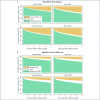IeDEA-WHO Research-Policy Collaboration: contributing real-world evidence to HIV progress reporting and guideline development
- PMID: 30515309
- PMCID: PMC6248847
- DOI: 10.1016/S2055-6640(20)30348-4
IeDEA-WHO Research-Policy Collaboration: contributing real-world evidence to HIV progress reporting and guideline development
Abstract
Partnerships between researchers and policymakers can improve uptake and integration of scientific evidence. This article describes the research-policy partnership between the International epidemiology Databases to Evaluate AIDS (IeDEA) ( www.iedea.org) and the World Health Organization (WHO), which was established in 2014. IeDEA is an international research consortium, which analyses data on almost 2 million people living with HIV under care in routine settings in 46 countries in Asia-Pacific, the Caribbean, Central and South America, North America and sub-Saharan Africa. Five multiregional analyses were identified to inform the WHO on progress towards the second and third 90s of the 90-90-90 targets in adults and children: (i) trends in CD4 cell counts at the start of antiretroviral therapy (ART); (ii) delays from enrolment in HIV care to ART initiation; (iii) the impact of ART guideline changes; (iv) retention in care, mortality and loss to follow-up; and (v) viral suppression within the first 3 years after initiating ART. Results from these analyses were contributed to the 2015 and 2016 WHO global HIV progress reports, will contribute to the 2018 report, and were published in academic journals. The partnership has been mutually beneficial: discussion of WHO policy agendas led to more policy-framed, relevant and timely IeDEA research, and the collaboration provided the WHO with timely access to the latest data from IeDEA, as it was shared prior to peer-review publication.
Keywords: research-policy partnerships, HIV, cohort data, observational data, World Health Organization.
Figures




References
-
- UNAIDS Fact sheet – Latest statistics on the status of the AIDS epidemic. 2018. Available at: www.unaids.org/en/resources/fact-sheet ( accessed September 2018).
-
- World Health Organization Global update on the health sector response to HIV. 2014. Available at: www.who.int/hiv/pub/progressreports/update2014/en ( accessed September 2018).
-
- World Health Organization Progress report. Global health sector response to HIV, 2000–2015. Focus on innovations in Africa. 2015. Available at: www.who.int/hiv/pub/progressreports/2015-progress-report/en ( accessed September 2018).
-
- World Health Organization Progress report 2016. Prevent HIV, test and treat all. WHO support for country impact. 2016. Available at: www.who.int/hiv/pub/progressreports/2016-progress-report/en ( accessed September 2018).
-
- World Health Organization, UNAIDS, UNICEF Global update on HIV treatment 2013: results, impact and opportunities. 2013. Available at: www.who.int/hiv/pub/progressreports/update2013/en ( accessed September 2018).
Publication types
Grants and funding
LinkOut - more resources
Full Text Sources
Research Materials
